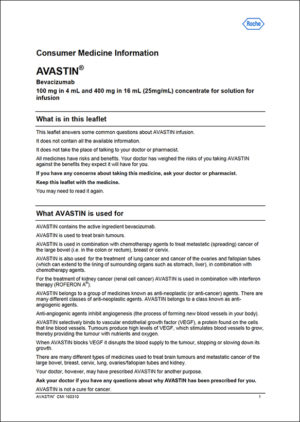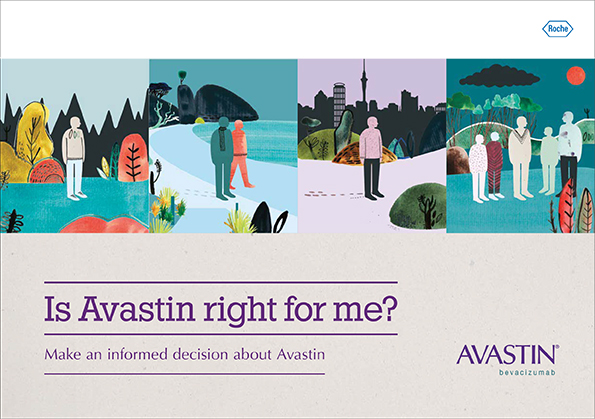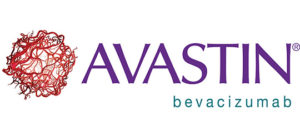Ovarian Cancer
Know your options
Avastin®
(bevacizumab)
Pronounced A-vas-tin
Avastin, also known as bevacizumab, is a targeted therapy for the treatment of a number of cancers including the treatment of ovarian cancer (including cancer of the fallopian tubes and peritoneal cancer). Avastin is given in combination with chemotherapy.
Avastin is not currently funded by PHARMAC for the treatment of ovarian cancer. This means you will need to pay for the medicine yourself.
Ask your doctor if Avastin is right for you.
How Avastin works

Avastin is not a cure for ovarian cancer, but it may give you more time before your cancer grows and spreads further.
Avastin works by blocking an important growth factor called vascular endothelial growth factor or VEGF. This disrupts blood flow to the cancer, restricting the supply of nutrients that it needs to grow and spread.
Avastin is usually used with chemotherapy, which aims to kill the cancer cells. As Avastin and chemotherapy work in different ways, the two types of medicine complement each other when they are used to treat cancer.
To learn about Avastin please refer to the Avastin patient booklet by clicking here.
Ask your doctor if Avastin is right for you.
Clinical trial data
Studies have looked at how well Avastin works for women with ovarian cancer.
A large study of women with previously untreated advanced ovarian cancer, showed that when Avastin was added to chemotherapy, the average length of time patients lived without their tumours growing or spreading increased by just over 6 months, compared to patients who received chemotherapy alone.
Another large study in women with ovarian cancer that did not respond to chemotherapy (recurrent platinum-resistant ovarian cancer) showed that those given Avastin with chemotherapy remained free of their disease for longer, compared to those who received only chemotherapy.
Avastin has not been shown to improve overall survival (OS) in women with advanced ovarian cancer or recurrent platinum-resistant ovarian cancer.
Possible side effects of Avastin
Everyone reacts differently to Avastin, so it’s important to know what the side effects are. Some people may have serious side effects – however, most do not.
For more information on the potential side effects with Avastin treatment, download the Avastin Consumer Medicine Information here.
How to access Avastin
Avastin is not funded by PHARMAC for the treatment of advanced ovarian cancer. This means that you will need to pay for the medicine yourself.
Roche has created a Cost Share Programme which offers assistance with the cost of the medicine. The Avastin Cost Share Programme caps the cost of the medicine after either a specific number of doses or after a specific cost. Once a patient reaches the cap, Roche will provide ongoing Avastin at no cost. However, other costs (such as doctor fees and administration costs) will still apply.

Ask your doctor if Avastin is right for you, and how the Cost Share Programme could make it more affordable for you.
Ready to take the next step?
As every patient is different, it’s important to speak to your doctor to find out if Avastin is right for you.
Talking to your doctor about Avastin
For further information about private treatment providers click here.
You can also talk to your current doctor about referral to a private doctor or treatment centre.
Handy resources



